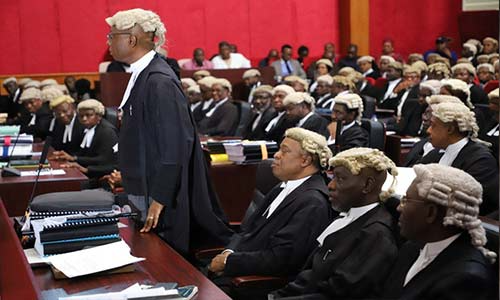Peter Obi filed a petition challenging the declaration of Bola Tinubu as the victor of the February 25 presidential election. A five-member panel overseen by Justice Haruna Tsammani struck out some of the paragraphs containing the allegations of irregularities and corrupt practices.
The presiding judge, Justice Abba Mohammed, removed the problematic sentences because they were “vague, imprecise, nebulous and failed to meet the requirements of pleadings.”
Justice Mohammed ruled on the preliminary objections brought by INEC, Tinubu, and the APC and stated that “averments” must not leave opportunity for misunderstanding or ambiguity, adding that the purpose of pleadings is to provide respondents with the relevant facts so that they can appropriately prepare.
The PEPC remarked that it is insufficient for the petitioners to generalize about particular collation centers or polling places when there are allegations of irregularities in more than 500 polling places.
Mohammed ruled that “averments must not be general but specific” and that “petitioners failed to specify polling units where anomalies occurred or where agents complained of alleged malpractice and irregularities.”
Furthermore, PEPC emphasized that not a single voting location was mentioned out of the more than 18,000 polling locations where the petitioners claimed INEC uploaded “blurred results” to the INEC Results Viewing (IReV) Portals.
They failed to list the polling places where Tinubu’s score was increased or decreased or where the election results were not submitted.
The tribunal ruled, adding that the petitioners simply make general claims of irregularities and malpractices, “They did not show the majority of votes they claimed they had scored.”
It is inconceivable that a petitioner would claim extensive rigging in 176,000 polling places, over 8,000 wards, 774 local government areas, 36 States, and the Federal Capital Territory (FCT) without identifying the precise location of the claimed abnormalities.
The petitioners’ use of a spreadsheet analysis, inspection findings, and expert reports was also criticized by Mohammed.
Mohammed contends that responders should receive such information so they can do their own analyses and provide appropriate responses.
The court ruled that the spreadsheet report, inspection findings, and expert reports were not served but rather were just named as papers to be considered for deciding the petition.

